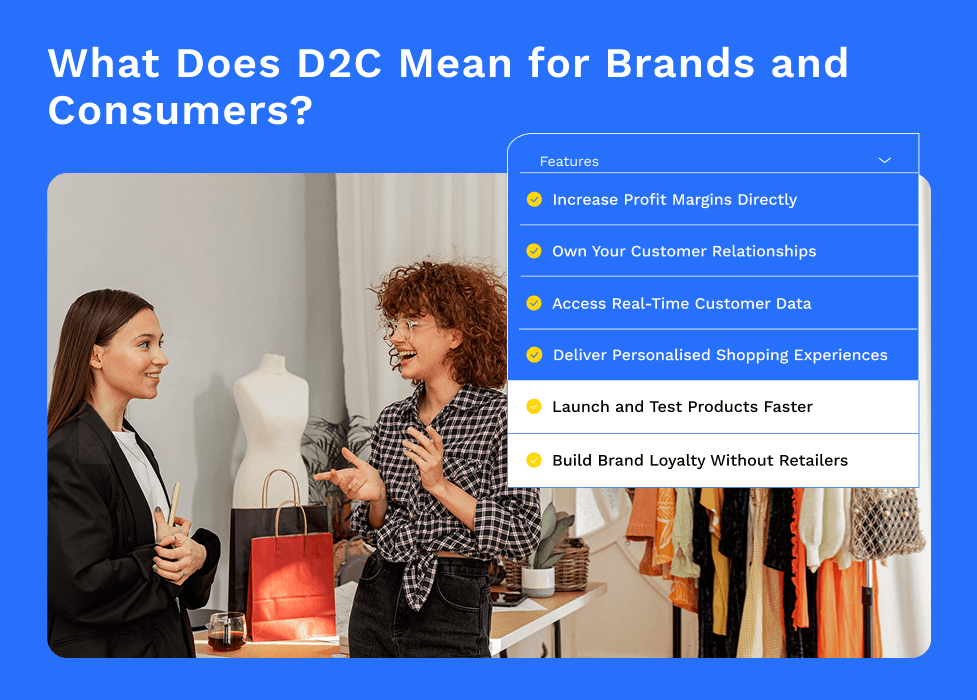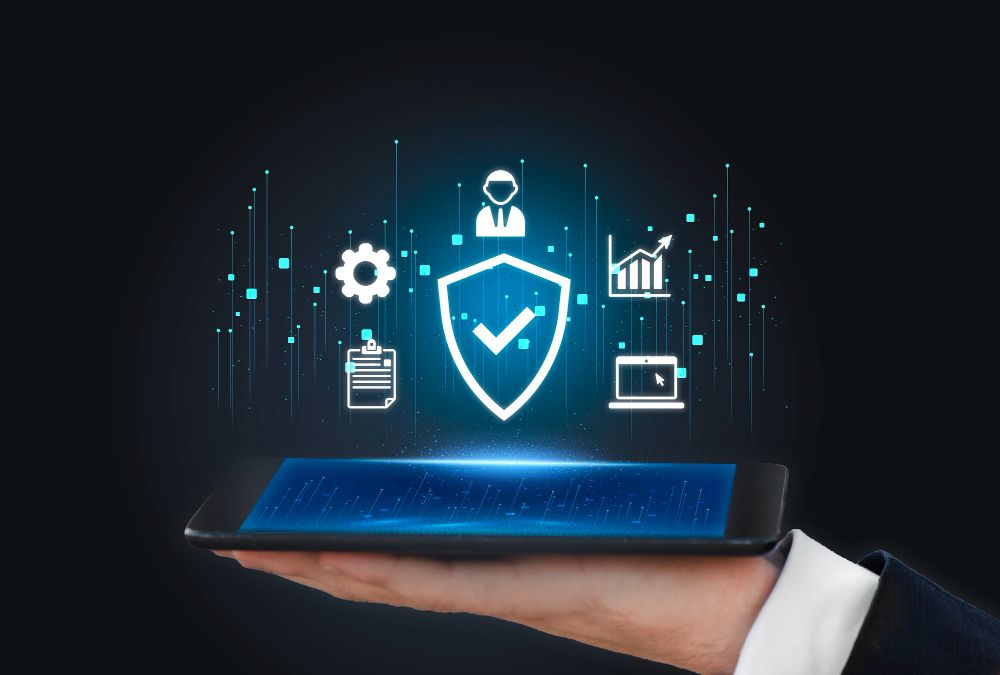Direct to Customer Marketing (D2C)
What Does D2C Mean for Brands and Consumers?
Tue, 26 Mar 2024 12:27:18 GMT
Speak to our Hyperlocal Expert

Editor’s Note: This post was originally published in Mar 2024 and was updated in Mar 2026 for accuracy and comprehensiveness.
What does D2C mean? D2C, or Direct-to-Consumer, is a model where brands sell directly to customers, cutting out retailers, wholesalers, and distributors. It gives brands full control over pricing, experience, and customer relationships from day one.
So why does the D2C model matter more than ever in 2026?
Because the way people buy has completely changed. Customers don't want to walk into a store and pick from whatever a retailer decided to stock. They want to buy directly from brands they trust, get personalised experiences, and receive products faster than ever before.
And brands are responding. Global Direct-to-Consumer e-commerce sales crossed $230 billion in 2025. Nike's D2C revenue now accounts for nearly 44% of total sales. Mamaearth built an entire billion-dollar business on the D2C model without depending on traditional retail.
That's not a coincidence. The D2C model removes the middleman, which means better margins for brands and better prices for consumers. Everyone wins except the distributor.
In this guide we cover everything. What does Direct-to-Consumer mean, how the D2C model actually works, real challenges brands face, strategies working in 2026, and how platforms like Sekel Tech help brands scale their D2C marketing services faster.
Let's get into it.
What Does D2C Mean?

D2C stands for Direct-to-Consumer. It's a business model where brands manufacture, market, and sell products directly to their end customers, without involving any third party like a retailer, wholesaler, or distributor.
No middlemen. No markup. No loss of control.
The concept itself isn't new. Farmers selling at local markets, tailors stitching clothes to order, small bakeries delivering straight to homes. That's always been D2C in its purest form. What changed is scale. The internet made it possible for any brand, big or small, to reach millions of customers directly.
So what does Direct-to-Consumer mean in practical terms?
It means when you buy skincare from a brand's website instead of a pharmacy shelf, that's D2C. When a mattress company ships straight to your door without a furniture store involved, that's the D2C model. When a startup sells protein supplements through Instagram without a single retail partnership, that's D2C what it means in 2026.
A quick way to remember it:
Traditional Model | D2C Model |
| Brand sells to distributor | Brand sells directly to customer |
| Retailer controls shelf space | Brand controls the experience |
| Limited customer data | Full customer data ownership |
| Lower margins | Higher margins |
The D2C model flipped the entire retail equation. And in 2026, it's no longer an alternative strategy. For many brands, it's the primary one.
What is the D2C Model and How Does It Work?
The D2C model is straightforward in theory. A brand creates a product, builds its own sales channel, and delivers directly to the customer. No retailer involvement. No distributor margins. Just brand to the buyer.
But in practice, it requires owning every part of the journey.
A traditional brand hands off responsibility after the factory. A D2C brand handles everything. Website, marketing, payment, packaging, shipping, returns, customer support. That's the trade-off. More control, more responsibility.
Here's how a typical D2C model works in 2026:
Step 1: Brand builds a direct sales channel - Own website, app, or social commerce store. Sometimes all three.
Step 2: Brand markets directly to consumers - Through SEO, social media, influencer partnerships, email, and paid ads. No retail shelf needed.
Step 3: Customer places order directly - No third party involved. Payment goes straight to the brand.
Step 4: Brand fulfils and ships - Either in-house or through a 3PL logistics partner.
Step 5: Brand owns the relationship - Customer data, feedback, repeat purchases, all managed directly.
D2C vs B2C: What's the Difference?
People confuse these two constantly. B2C means any business selling to consumers, including through retailers. D2C is specific. The brand skips the retailer and sells direct. Amazon selling Nike shoes is B2C. Nike selling through Nike.com is D2C.
D2C | B2C | |
| Sells through | Own channel | Retailers, marketplaces |
| Customer data | Brand owns it | Retailer owns it |
| Pricing control | Full control | Shared with retailer |
| Margins | Higher | Lower |
| Relationship | Direct with buyer | Through middleman |
Read Also - D2C vs B2C in 2026: What is the Difference
D2C vs B2B: What's the Difference?
B2B sells to other businesses. D2C sells to the end consumer directly. Completely opposite directions.
D2C | B2B | |
| Customer | End consumer | Another business |
| Order size | Small, frequent | Large, infrequent |
| Marketing | Emotional, personal | Logical, data-driven |
| Relationship | Brand to buyer | Business to business |
Before we dive deeper, here's a quick video breaking down D2C vs B2C in simple terms. "D2C vs B2C: Understanding the Key Differences and Benefits"
Why Are So Many Brands Going D2C in 2026?
Five years ago, D2C was an experiment. Today it's a survival strategy.
The numbers tell the story. According to Statista, global D2C e-commerce is projected to hit $270 billion by the end of 2026. In India alone, the D2C market crossed $12 billion in 2025 and is growing at 40% year on year, according to IBEF. Brands aren't going Direct-to-Consumer because it sounds good in a boardroom. They're doing it because the margins, data, and customer relationships make traditional retail look outdated.
Here's exactly why:
1. Higher Margins, More Control
Every middleman in a traditional supply chain takes a cut. Distributor margin. Retailer margin. Shelf placement fees. By the time a product reaches the customer, the brand might keep 30-40% of the retail price.
The D2C model changes that math completely. According to McKinsey, brands operating Direct-to-Consumer keep 60-70% or more of the retail price. That margin difference funds better products, better marketing, and better customer experiences.
2. Direct Access to Customer Data
This is the one traditional retail can never offer.
When a customer buys through a retailer, that retailer owns the data. The brand knows nothing about who bought, when, why, or what they searched before purchasing.
With the D2C model, brands see everything. According to Salesforce, 88% of customers say the experience a company provides matters as much as its products. That experience is only possible when brands own their customer data directly.
3. Stronger Brand Storytelling
A retailer sells hundreds of brands. Your product gets a shelf tag and nothing else.
Direct-to-Consumer gives brands a full canvas. Website, packaging, email, social, unboxing experience. Every touchpoint tells the brand story exactly the way the brand wants it told. According to Forbes, consistent brand presentation across all channels increases revenue by up to 23%.
4. Faster Product Testing and Launches
Traditional retail requires months of planning, buyer approvals, and minimum order commitments before a new product hits shelves.
D2C brands launch in weeks. Test with a small audience. Read real feedback. Iterate fast. This speed is why D2C brands consistently out-innovate larger traditional competitors.
How Does the D2C Model Impact Brands?
Going Direct-to-Consumer changes how a brand operates at every level.
1. Ownership of customer relationships is the biggest shift. Brands no longer rely on a retailer to represent them. Every interaction, from the first Instagram ad to the delivery notification, is a brand-controlled moment.
2. Pricing power increases significantly. Without retailer markups, brands can price more competitively while maintaining healthier margins. According to Harvard Business Review, brands that control their own distribution report 25% higher customer lifetime value compared to those selling through retailers.
3. Marketing becomes more precise. D2C brands collect first-party data directly from buyers. This means ads target real customers, not assumed demographics. According to Google, first-party data driven campaigns deliver 2x higher revenue lift compared to third-party data campaigns.
4. Product development accelerates. Customer feedback comes directly to the brand, not filtered through a retail buyer. A D2C brand knows within days if a new product is working. A traditional brand might wait months for retailer sell-through data.
How Does D2C Impact Consumers?
Honestly, consumers come out ahead in the D2C model.
1. Better prices - When brands cut out the middleman, those savings pass to the buyer. According to Deloitte, D2C brands offer products at 15-20% lower prices on average compared to the same products sold through traditional retail channels.
2. More personalisation - A retailer treats every customer the same. A D2C brand knows your purchase history, preferences, and size. According to Epsilon, 80% of consumers are more likely to purchase from a brand that offers personalised experiences.
3. Faster delivery - D2C brands control their own fulfilment. Many have invested heavily in logistics infrastructure to deliver within 24 to 48 hours. No waiting for a retailer to restock.
4. Direct communication with the brand - Have a problem with your order? You talk to the brand directly, not a retailer who has to call the brand on your behalf. According to PwC, 73% of consumers say a good experience is key in influencing their brand loyalties.
5. Access to exclusive products - Many D2C brands offer products, variants, or limited editions exclusively through their own channels. Buying direct gets you access that retail customers simply don't have.
The one downside for consumers is trust. Buying from a brand's website for the first time requires a leap of faith. This is why reviews, return policies, and transparency matter so much in the Direct-to-Consumer space.
Challenges of the D2C Model (And How to Overcome Them)
The D2C model gives brands more control but also more responsibility. Here are the real challenges and how smart brands are solving them.
1. Customer Acquisition Costs
Without a retailer putting your product in front of shoppers, you find customers yourself. Paid ads, SEO, influencer marketing, email. It all costs money.
Customer acquisition costs for D2C brands have risen significantly over the last five years, mainly because Meta and Google ad prices keep climbing.
How to overcome it: Build organic channels first. SEO, content, email list. Paid ads should amplify what already works, not carry the entire load.
2. Logistics and Fulfilment
A retailer handles storage, packing, and shipping. In the D2C model, that's your problem now.
Managing inventory, processing returns, delivering within 24-48 hours, all of this requires real infrastructure. Get it wrong and customers leave. Get it right and it becomes your biggest competitive advantage.
How to overcome it: Start with a reliable 3PL partner. Build in-house capabilities as volume grows. Don't try to do everything on day one.
3. Building Trust Without Retail Presence
Picking up a product in a store feels safe. Buying from a brand's website for the first time requires a leap of faith.
Trust has to be built entirely online in the D2C model. That's harder than it sounds.
How to overcome it: Invest in genuine customer reviews, clear return policies, and fast customer support. Social proof does the job that shelf presence used to do.
4. Scalability
The D2C setup that works for 1,000 orders a month breaks at 50,000. Systems, people, and processes all need to grow together.
Many brands hit a growth ceiling because their operations weren't built to scale. They grow fast, then crack under pressure.
How to overcome it: Automate early. Invest in proper inventory management and D2C marketing services that grow with your business rather than holding it back.
D2C Marketing Strategies That Actually Work in 2026
Having a D2C model is one thing. Growing it is another. Here's what's actually working right now.
1. Personalisation at Scale

Customers expect brands to know them. Generic emails and one-size-fits-all pages don't convert anymore. Personalisation means product recommendations based on purchase history, emails triggered by real behaviour, and experiences that feel built for the individual. Nike lets users customise sneakers entirely through their app. That's where personalisation is heading.
2. Social Media and Influencer Marketing

D2C brands don't have retail foot traffic. Social media is their storefront. The brands winning in 2026 aren't the ones with the biggest budgets. They're creating content that feels real. Behind-the-scenes videos, founder stories, honest product demos. A genuine recommendation from a trusted influencer carries more weight than any ad.
3. Data and Analytics

This is where the D2C model earns its biggest advantage over traditional retail. Every click, purchase, and abandoned cart is data the brand owns. Track what actually matters: customer lifetime value, repeat purchase rate, cost per acquisition. Brands using this data well know what a customer will buy next before the customer does.
4. Sustainability as a Brand Value

Consumers in 2026 buy with their values, not just their wallets. D2C brands have a unique advantage here because they control their entire supply chain, packaging, and messaging.
Brands like Allbirds and Mamaearth built their identity around sustainability and it became their strongest acquisition channel. Authenticity matters though. Greenwashing gets called out fast.
5. Seamless Omnichannel Experience

The best D2C brands don't just sell online. They create a connected experience across every touchpoint. Website, app, social commerce, WhatsApp, physical pop-ups. According to Google, omnichannel customers spend significantly more than single-channel customers. The D2C model makes this possible because the brand controls every channel directly.
Watch this quick video to see how brands are building successful D2C strategies in action.
Successful D2C Brand Examples in 2026
The best way to understand the D2C model is to see it working in the real world.
1. Nike (Sportswear) - Nike didn't abandon retail. They made D2C their priority. Direct sales through Nike.com and their app now account for nearly 44% of total revenue. They control pricing, storytelling, and customer data entirely. Brands serious about D2C need the same data ownership, which is exactly what a Customer Data Platform makes possible at scale.
2. Warby Parker (Eyewear) - Warby Parker proved that a category dominated by physical retail could be flipped completely. They built trust without a single store through home try-ons and genuine customer reviews. Managing that trust online requires strong review management from day one.
3. Mamaearth (Skincare) - India's own D2C success story. Mamaearth built a billion dollar brand without depending on traditional retail shelves. Direct customer connection and social-first marketing did what years of retail presence couldn't.
4. Dollar Shave Club (Grooming) - Launched with one viral video. No retail. No distributor. Just a direct subscription model that made razor buying effortless. Acquired for $1 billion entirely because of their D2C customer base. Tracking that kind of growth requires real-time sales conversion analytics at every stage.
The pattern across all four is the same. Own the customer relationship. Control the experience. Use data to improve constantly. That's what the D2C model enables that traditional retail simply cannot.
How Sekel Tech Powers Your D2C Marketing Services
Building a D2C model is one thing. Scaling it without losing control of customer experience, data, and operations is where most brands struggle.
That's exactly what Sekel Tech is built for.
Sekel Tech is a full-stack D2C marketing service provider that gives brands everything they need to grow direct customer relationships without depending on retailers or third-party platforms.
Here's how it works in practice:
- Get Found Locally: Most D2C brands focus on national reach and ignore local discovery. Sekel Tech's Listing Management and Store Locator ensure your brand shows up exactly when nearby customers are searching.
- Create Hyperlocal Brand Presence: Each location needs its own identity. Sekel Tech's Store Microsites give every store a dedicated page with local offers, contact details, and product information. Better local SEO. Better customer experience.
- Run Smarter Campaigns: Sekel Tech's Digital Campaign Management lets brands run targeted campaigns by location, audience, and behaviour. Reach the right customer at the right moment without wasting budget on broad generic ads.
- Manage Orders End to End: D2C fulfilment is complex. Sekel Tech's Order Management and Store 2 Door bridge online discovery with offline fulfilment. Customers find you online, order directly, and receive at their doorstep.
- Engage Customers with AI: Sekel Tech's Sekel AI ChatBot handles customer queries, product questions, and lead capture automatically. 24/7 engagement without adding headcount.
The brands winning with D2C in 2026 aren't just selling directly. They're building smarter operations, deeper customer relationships, and faster feedback loops. Sekel Tech makes all of that possible from one platform.
See how Sekel Tech helps brands manage listings, reviews, and sales all from one place. "Manage Listings, Content, Reviews & Sales - All in One Place"
Frequently Asked Questions (FAQs)
1. What is B2B, B2C, C2C, and D2C?
B2B is businesses selling to other businesses. B2C is any business selling to consumers, usually through retailers. C2C is consumers selling to each other, think OLX or eBay. D2C is a brand selling directly to consumers with no middleman involved. The D2C model gives brands full control over pricing, experience, and customer data.
2. What is D2C Model?
The D2C model, or Direct-to-Consumer model, is a business approach where brands manufacture and sell products directly to customers without involving retailers, wholesalers, or distributors. Brands control pricing, packaging, and the entire customer experience. It leads to higher margins, better customer data, and stronger brand loyalty compared to traditional retail.
3. Why do consumers prefer DTC?
Better prices, faster delivery, and more personalised experiences. When brands sell directly, savings from cutting middlemen often pass to buyers. Consumers also get to interact with the brand directly, not a retailer who barely knows the product. That direct relationship builds trust faster than any shelf placement ever could.
4. Is Direct-to-Consumer the future?
For most product categories, yes. Global D2C e-commerce is growing at nearly 40% year on year. Consumers increasingly prefer buying directly from brands they trust. Retailers are losing influence. Brands that build strong Direct-to-Consumer channels now will be significantly harder to compete with five years from now.
5. How to grow a DTC business?
Start with organic channels, SEO, content, and email before scaling paid ads. Own your customer data from day one. Invest in personalisation, not just discounts. Build genuine reviews and social proof. And use the right D2C marketing services to manage listings, campaigns, and analytics at scale as you grow.
Conclusion
The D2C model isn't a trend anymore. It's the direction retail is heading.
Brands that own their customer relationships, control their data, and deliver personalised experiences are consistently outgrowing those still dependent on traditional retail. That's what Direct-to-Consumer makes possible.
But understanding what does D2C mean is just the starting point. The real work is execution. Building the right systems, the right marketing strategy, and the right technology stack to scale without losing what makes your brand worth buying from in the first place.
The brands that get this right in 2026 won't just survive the shift away from traditional retail. They'll be the ones defining what modern retail looks like for the next decade.
If you're serious about growing your D2C model, Sekel Tech's end-to-end D2C marketing services give you everything you need in one platform. From local discovery to real-time analytics to customer engagement.
Share
Similar Blogs
Loved this content?
Sign up for our newsletter and get the latest tips & updates directly in your inbox.
There’s more where that came from!